Special Feature 2
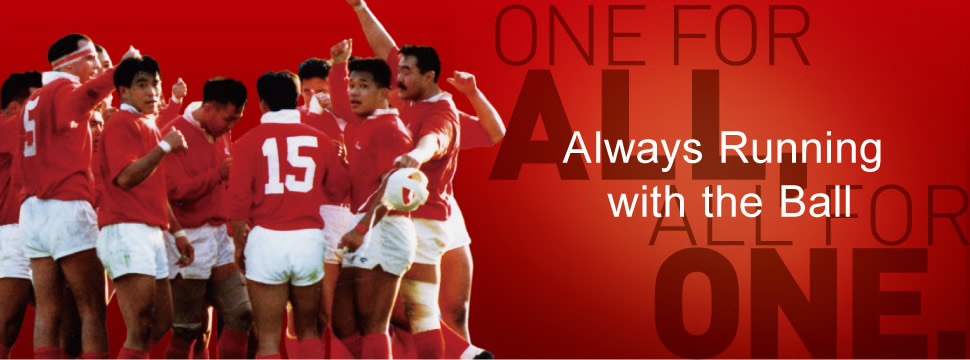
With Japan's performance at the Rugby World Cup and its participation in men's and women's rugby sevens at the Rio de Janeiro Olympics, Japanese rugby has been drawing growing attention.
For 88 years, the Kobe Steel Rugby Club has been running at the forefront of Japanese rugby. In addition to playing in the Top League, the club has also promoted rugby and contributed to society in a variety of fields, for instance by broadening horizons for the sport by supporting high school rugby, by helping to promote women's rugby sevens, and by carrying out recovery efforts for the Great East Japan Earthquake.
The Kobe Steel Group and Kobe Steel Rugby Club have always run side-by-side with Japanese rugby. In the following sections we will introduce the lasting contributions Kobe Steel has made to society through sports.
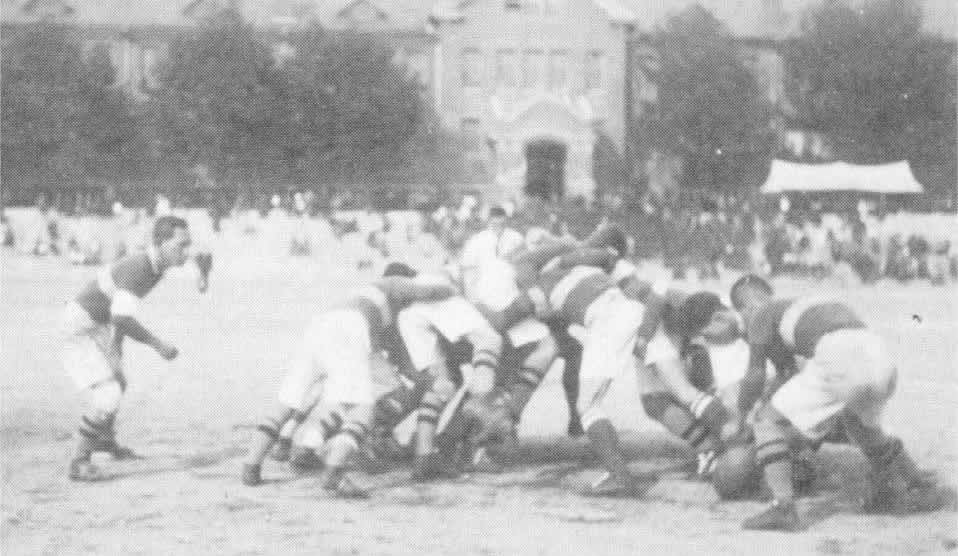
The Kobe Steel Rugby Club took its first steps in 1928. The head of the Kobe Steel Machinery Division at the time, Jisaburo Tokuda, began focusing on rugby as a way to nurture young employees and strengthen them in body and soul. The Kobe Steel Rugby Club was inaugurated in the employee cafeteria in October, with 15 young employees joining the team. Today, the Kobe Steel Rugby Club is the longest running club in the Japan Rugby Top League, a league of company teams.
Over their 88-year history, the Kobe Steel Rugby Club's most stellar achievement was its record of seven consecutive victories, which began in 1989. The team beat out powerful competition to score the seven wins, which began at the 26th All-Japan Rugby Football Championship in 1989 and lasted until the 32nd championship in 1995. Five team members were also selected to represent Japan at the 2nd Rugby World Cup held in 1991. It was the team's golden age.
The team's official name was changed to the KOBELCO Steelers around this time, as well. The name was thought up after the first victory in 1989, by then Vice-Captain Oyagi, to reflect the motto: "Bodies of steel, hearts of gold. We call them Kobelco Steelers."
In 2003 the club captured the first Japan Rugby Top League championship. Around this time the Kobe Steel Rugby Club also began focusing on social contributions, in particular on promoting Japanese rugby and widening horizons for the sport.
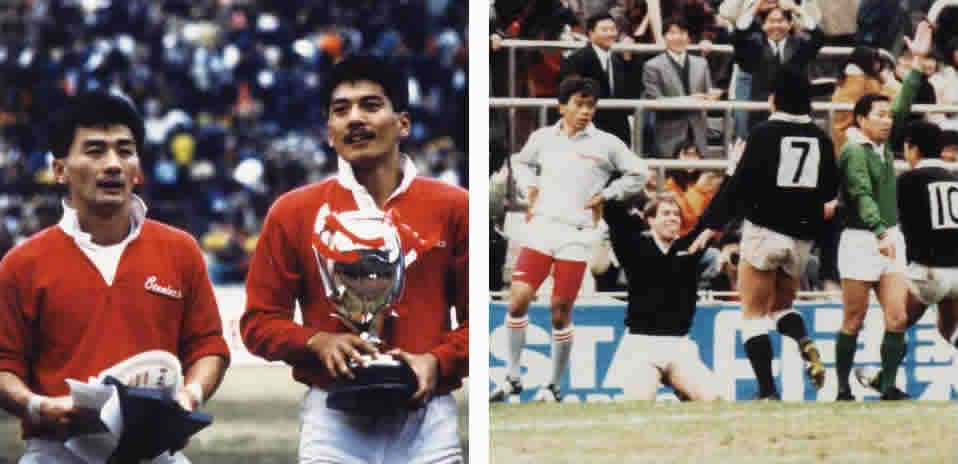
Center photo: January 8, 1991, deadlock try which led to third victory at 29th All-Japan Rugby Football Championship
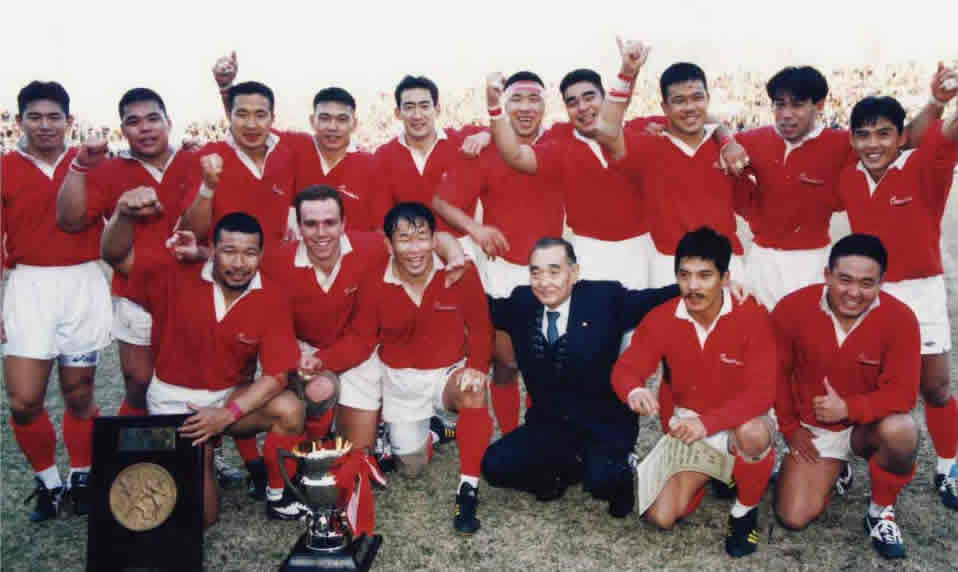
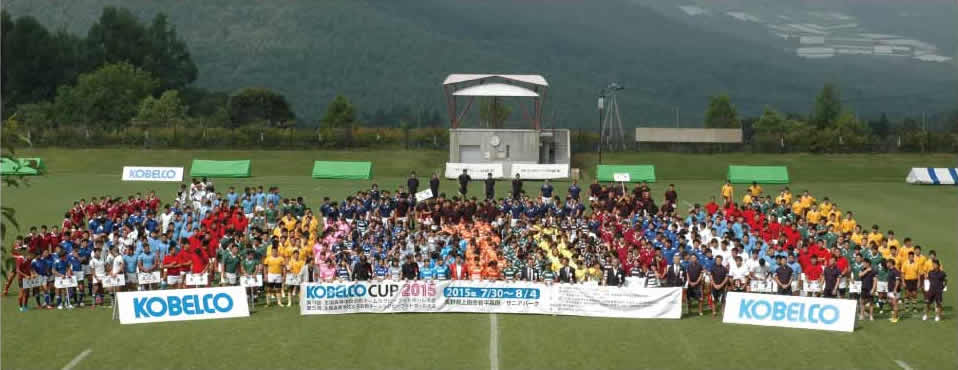
The first KOBELCO Cup was held in Yubari, Hokkaido, in 2005. In its fourth year, 2008, the tournament was moved to Sugadaira in Nagano Prefecture. Matches are divided into nine nation-wide regional blocks. The tournament is divided into the under-17 (U17) division for players from strong schools that aim to produce future national team athletes, and the under-18 (U18) division, for inter-school teams made up of individual athletes unable to attend the nationals at Hanazono Stadium due to being from schools without enough players. The year 2015 marked the tournament's 11th year.
We also hold "the other Hanazono," in advance of the official winter nationals, in which two teams made up of players chosen from those participating in the KOBELCO Cup U18 division—east vs. west—compete against each other. January 7, 2016 marked the match's 8th year.
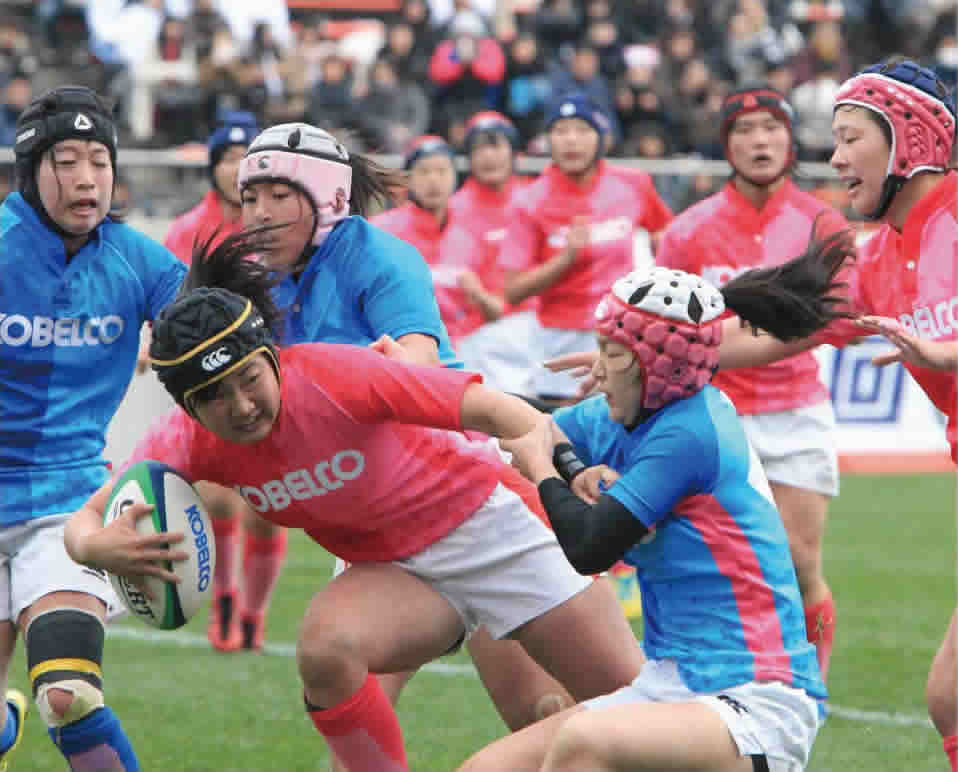
The KOBELCO Cup introduced a women's division in 2011. With men's and women's rugby sevens now recognized as an official Olympic event, we are working to raise players' skills in advance of the 2016 Rio de Janeiro and 2020 Tokyo Olympics.
Additionally, In 2015, after the December 27 Hanazono nationals, we held a U18 Hanazono Women's 15-Player Tournament, in preparation for the 2017 Women's Rugby World Cup.
The Kobe Steel Group and Kobe Steel Rugby Club, which have sponsored the KOBELCO Cup for over 10 years, will continue to support men and women high school rugby athletes, broadening horizons for the sport and nurturing strong international players.
From the 8th Rugby World Cup held in England up until the 2020 Tokyo Olympics, major international rugby tournaments will be held nearly every year. The Rugby World Cup will be held in Japan for the first time in 2019, and Kobe has been selected as one of the host cities. During this time, the Kobe Steel Group and Kobe Steel Rugby Club will make even greater contributions to the popularity and level of Japanese rugby.
At the 2015 Rugby World Cup, Japan unfortunately lost its chance to advance to the finals. However they did put in a good showing and were able to defeat South Africa. Four Kobe Steel Rugby Club members joined the Japan team to compete at the pool stage—Hiroshi Yamashita, Takeshi Kizu, Shoji Ito and Craig Wing.
The team continues to challenge itself on the world stage. Japan's team, the Sun Wolves, are participating in the international Super Rugby competition held from February to August, which pits top international clubs against each other. Two Kobe Steel Rugby members have been included on the team—Takeshi Kizu and Ryohei Yamanaka. Players Hiroshi Yamashita and Andrew Ellis, meanwhile, have joined teams in New Zealand and elsewhere to battle it out against top world athletes.
These experiences at the Rugby World Cup and other top international tournaments will help advance Japanese rugby to new levels.
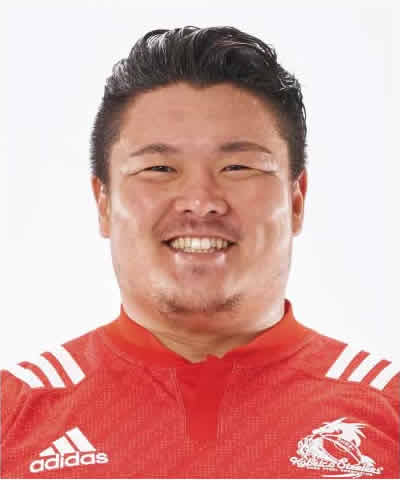
I would like to express my extreme happiness at having this chance to participate in the Super Rugby tournament, as well as my thanks to the company for so graciously allowing me to go and to everyone at the Chiefs for their offer. This is a new challenge for me so I want to give it my all and make the most of my abilities. And I'm looking forward to taking it all in and then returning to Kobe stronger than before.
On January 15, 1995, soon after the Kobe Steel Rugby Club's seventh consecutive victory, the Hanshin-Awaji Earthquake struck, causing massive damage. The Kobe Steel Rugby Club members joined with players from other teams to form a neighborhood watch. They referred to themselves as the Kurogane Support Corps, and carried out 24-hour patrols of the areas near company housing that were hit hardest. Local residents were very appreciative of these efforts, which helped return peace of mind.
In 2011, the Great East Japan Earthquake struck. The Kobe Steel Rugby Team has been carrying out a variety of activities to help the people of Tohoku, hoping to pay them back for the support they, too, showed during the Hanshin-Awaji Earthquake. In June 2012, the team visited Kamaishi, Iwate Prefecture, to carry out relief efforts together with the city's rugby team, the Kamaishi Seawaves R.F.C. Approximately 80 team members and staff worked for around three hours to clear debris and driftwood from around the Nehama Coast, as well as mud that had accumulated in drains. They also held an event for local residents and a rugby clinic at Kamaishi athletic field for around 100 elementary to high school aged students. Players from both teams even formed sides with the elementary school students for a fun match. It was the teams' desire to work together on relief, after having both experienced major earthquakes, that made the event possible.
The Kobe Steel Group and Kobe Steel Rugby Club have also been caryring out other relief activities for the Great East Japan Earthquake, such as the V7 Charity Match held in September 2012 between alumni from the Kobe Steel and Nippon Steel Kamaishi rugby clubs, fundraising activities such as donations undertaken at match venues, and hosting rugby events in Fukushima and Miyagi prefectures.
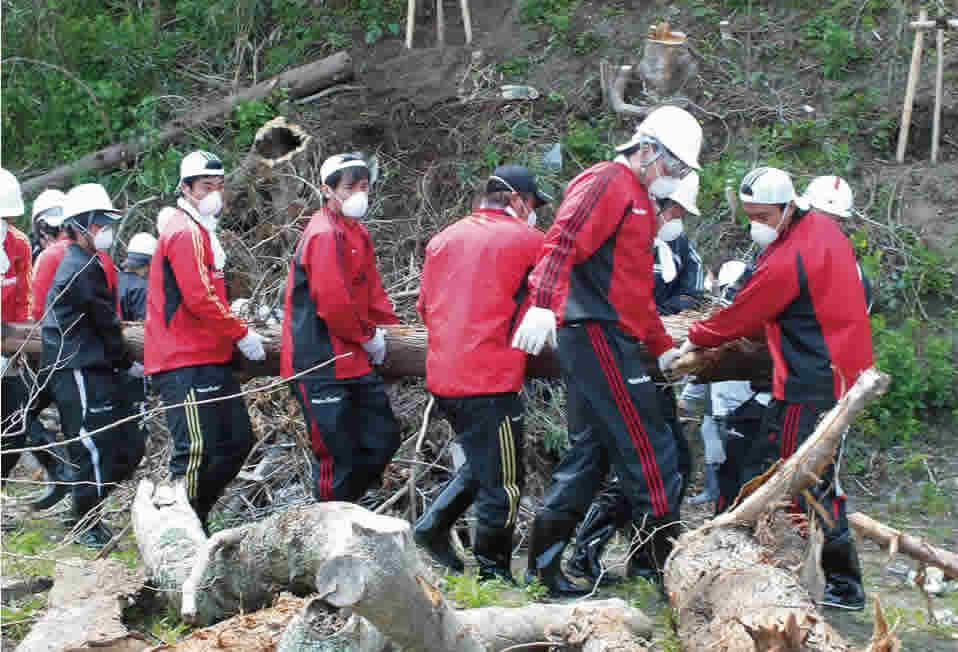
where the tsunami's effect can still be seen
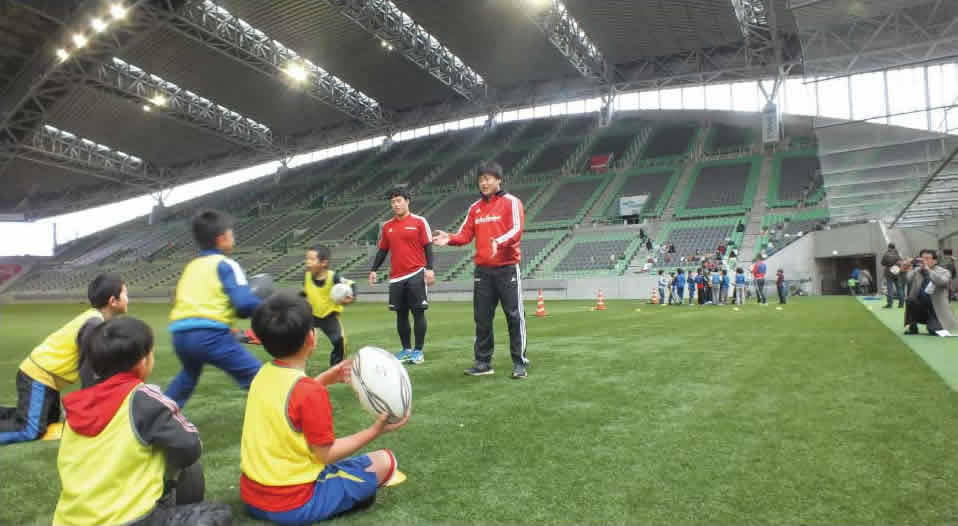
"One for all, all for one." These words represent the rugby spirit of teamwork behind much of what the Kobe Steel Rugby Club does, as a team with close ties to the local community. For instance, at KOBELCO Rugby Festival, the fan event held every summer at the Nadahama ground, the team hosts a variety of activities to boost the local community, including an athletic meet with players and fans, an amateur touch football tournament, and a talkshow panel with members of the national team. The players also participate in other local sports-related events held nearby and in other areas throughout Japan.
"One for all, all for one." The Kobe Steel Group and Kobe Steel Rugby Club coexists hand-in-hand with the community, and will continue to contribute to society through sports.
The Group's contributions to society through sports are not limited to rugby alone.
Below we introduce just a few of the many activities the Kobe Steel Group and Kobe Steel Rugby Club carry out in support of sports.
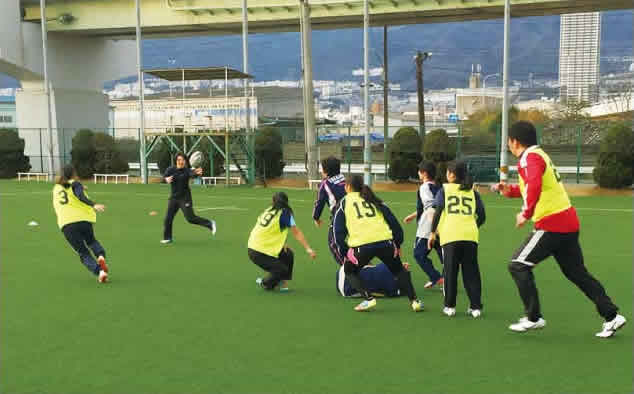
The artificial-turf sports ground and tennis courts at the Nadahama Sports Zone, which is home to the Kobe Steel Rugby Club, are open to the general public.
Equipment for sports such as rugby, soccer, American football and ground golf are also available for rent at the artificial-turf grounds. The field serves as a gathering place for sports-loving members of the community, including local schools, rugby teams and soccer teams.
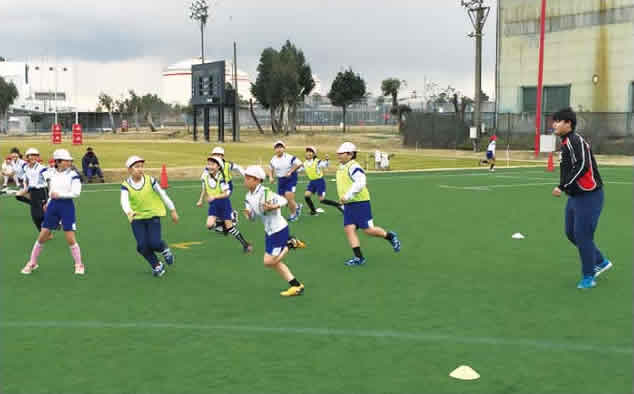
Space Ball is a new sport devised by SCIX, a sports NPO supported by Kobe Steel. Like rugby and soccer, it involves moving a ball through space, and was designed to train children's physical abilities and spatial awareness. SCIX relies on the Kobe Steel Group's unique collection of rugby professionals and facilities, inviting local elementary school children to Nadahama Sports Zone to participate in the new sport.
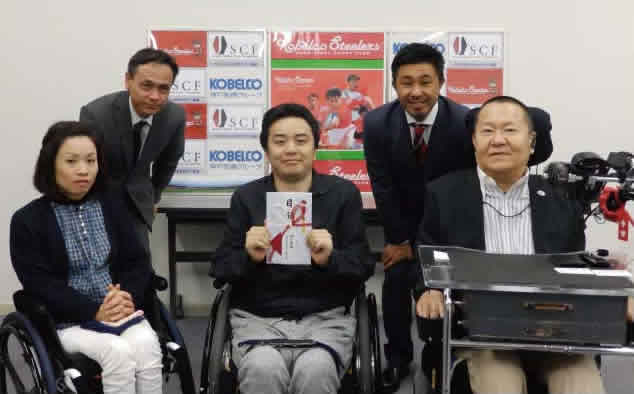
On November 2, 2015, the Kobe Steel Rugby Club donated \226,502 to the Japan Spinal Cord Foundation (an NPO). These funds came from match fundraising activities held during the last season and a portion of the proceeds of the KOBELCO Rugby Festival 2015, which was held on May 31, 2015. The Kobe Steel Rugby Club has been donating to the Foundation for 13 years, as spinal cord damage is an injury to which rugby players are particularly susceptible, and plans to continue carrying out fundraising activities to this end.
The Kobe Steel Rugby Club will keep running toward the future.